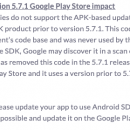- Freeware
- - Development
- - Other
- - Android SDK
Android SDK 8.12.1 freeware
The Android SDK, developed by Google, is an essential toolkit for Android app developers, offering a comprehensive set of tools, libraries, and resources to create high-quality applications. With features like a robust emulator, intuitive code editor, and powerful debugging tools, it streamlines the development process. The SDK supports a wide range of devices and Android versions, ensuring compatibility and performance. Regular updates and extensive documentation make it an invaluable resource ... ...
| Author | Gradle Inc. |
| Released | 2025-02-21 |
| Filesize | 130.00 MB |
| Downloads | 2208 |
| OS | Windows 11, Windows Server 2016, Windows 10 32/64 bit, Windows Server 2012, Windows 2008 R2, Windows 8 32/64 bit, Windows 7 32/64 bit, Windows Vista |
| Installation | Instal And Uninstall |
| Keywords | Java, development, developer, builder |
| Users' rating (51 rating) |
Android SDK Free Download - we do not host any Android SDK torrent files or links of Android SDK on rapidshare.com, depositfiles.com, megaupload.com etc. All Android SDK download links are direct Android SDK download from publisher site or their selected mirrors.
| 8.12.1 | Jan 24, 2025 | New Release | It fixes the following issues: #31245 FileLockCommunicator is not compatible with macOS 15.1 firewall and Crowdstrike/SentinelOne #31942 Default working directory for ExecSpec changed between 8.11 and 8.12 #31946 Build failed on Linux after upgrading 8.11.1 -> 8.12 #32016 Incorrect output format for Java compiler problems |
| 8.12 | Dec 20, 2024 | New Release | New features and usability improvements: Error and warning reporting improvement: Gradle provides a rich set of error and warning messages to help you understand and resolve problems in your build. Summarization in the HTML report for problems: The Problems API provides structured feedback on build issues, helping developers and tools like IDEs identify and resolve warnings, errors, or deprecations during configuration or runtime. This release introduces a new problem summarization mechanism that reduces redundancy in the generated HTML Problems Report. The feature limits the number of identical problems reported and provides a summarized count of additional occurrences in the summary report. Ambiguous Artifact Transformation chains are detected and reported: Previously, when two or more equal-length chains of artifact transforms produced compatible variants to satisfy a resolution request, Gradle would arbitrarily and silently select one. Gradle now emits a warning for this case. This deprecation warning is the same failure message that now appears when multiple equal-length chains are available, producing incompatible variants that could each satisfy a resolution request. In this case, resolution fails with an ambiguity failure, and Gradle emits a message. The formatting of this message has been improved to comprehensively display information about each complete chain of transformations that produces the candidates that would satisfy the request. This allows authors to better analyze and understand their builds, allowing them to remove ambiguity. Platform enhancements: Gradle provides many features for specific platforms and languages. File-system watching and continuous mode support on Alpine Linux File-system watching is now supported on Alpine Linux, a popular choice for container-based images and the default distribution for Docker. The feature is enabled by default, as is the case with all other supported platforms. Additionally, it is now possible to run bui |
| 8.11.1 | Nov 20, 2024 | New Release | BuildEventsListenerRegistry corrupted with Isolated Projects and parallel configuration Running executables sporadically fails with ETXTBSY (Text file busy) ArrayIndexOutOfBoundsException after upgrading to gradle 8.11 when generating problems report Unable to run Gradle task in 8.10 due to bytecode interception |

